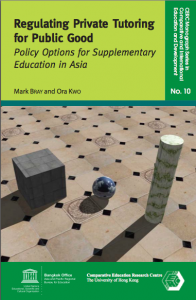 | Mark Bray and Ora Kwo ISBN 978‐988‐17852‐9‐9 March 2014; 93 pages; US$16/HK$100 Published by Comparative Education Research Centre (CERC) in collaboration with the United Nations Educational, Scientific and Cultural Organizaton (UNESCO) The book can be downloaded for free or ordered from CERC. |
| Recent years have brought global expansion of private supplementary tutoring alongside regular school systems. This expansion has far-reaching implications for the nurturing of new generations, for social and economic development, and for the operation of school systems. Some dimensions are positive while other dimensions are problematic. Supplementary tutoring is especially visible in Asia. The formats of tutoring range from one-to-one provision to large classes. Some tutoring is provided by teachers and by specialist companies, while other tutoring is provided informally by university students and others. Using a comparative lens, this book examines possible government responses to the expansion of private supplementary tutoring. In general, the book suggests, the sector should be given more attention. The work shows wide diversity in the regulations introduced by governments in the Asian region. It notes not only that these governments can learn much from each other, but also that policy makers in other parts of the world can usefully look at patterns in Asia. The book also stresses the value of partnerships between governments, tutoring providers, schools, teachers’ unions, and other bodies. Mark BRAY is UNESCO Chair Professor in Comparative Education at the University of Hong Kong, and is a former Director of UNESCO’s International Institute for Educational Planning. Ora KWO is an Associate Professor and a member of the Comparative Education Research Centre in the Faculty of Education at the University of Hong Kong. Review published in: Asia Pacific Journal of Education, Volume 34, Issue 4, 2014: 518-519 |












